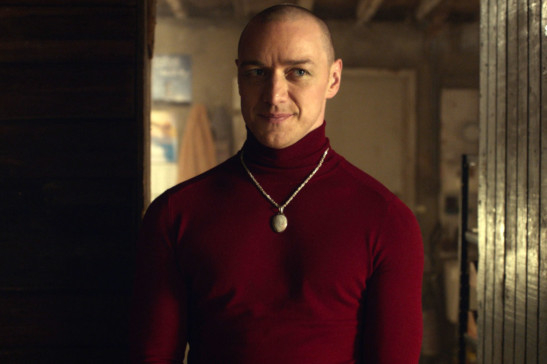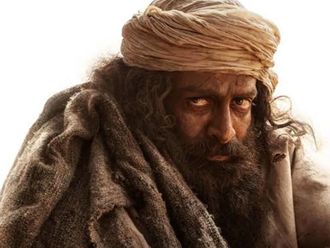
James McAvoy is extolling the virtues of insobriety. He was at the San Diego Comic-Con in July 2015 doing early promotion for X-Men: Apocalypse, his third round as mutant godfather Professor X, and it unexpectedly turned into a wild celebration. “There was a big party, you couldn’t turn around without bumping into somebody off the telly. My mate Jesse was playing miniature golf in the middle of it. We were getting particularly drunk, and then I saw M Night Shyamalan.”
They hadn’t met before.
“He goes: ‘You’re James McAvoy!’ And I said: ‘You’re M Night Shyamalan! What do I call you?’ I was very drunk.”
The point, says McAvoy, animatedly, is that his agent had been on at him for ages to go to LA to schmooze the scene. He could never be bothered to do it. But there he was meeting Shyamalan, which led to him being cast in the director’s new film, Split.
“The minute I [expletive] set foot in California I get a job that is one of the most interesting roles I’ve ever played,” he says, amused at his own good fortune. “The moral of the story is: when in California, get really hammered.”
“Interesting” is downplaying it somewhat. In Shyamalan’s psychological horror, ostensibly he’s Kevin. But Kevin has dissociative identity disorder (DID) and a total of 23 alternate personalities — also known as alters — who often struggle to coexist harmoniously. It starts with him rather brutally abducting three young women and locking them in a basement but, this being twist-lover Shyamalan, there’s more to Kevin’s condition than meets the eye. Over the course of the film we meet nine of those 23, among them fashion designer Barry, his grounded dominant identity who has previously kept some of the more troublesome alters, such as abductor Dennis, at bay; Hedwig, a sensitive nine-year-old; and cross-dressing Patricia, chilling in her calculated calm.
It’s an agitated, creepy horror and McAvoy revels in it, an unnerving, threatening presence even as the supposedly more benign characters. When he started reading the script, not knowing of the psychological complexity to come, he was concerned it might be the sort of nasty genre exercise we’ve seen much of before. “That worried me,” he says, “but then as soon as Kevin came in the room as Patricia, I was like: ‘Ah, right! I’m gonna have fun with this.’ It’s not just sensational, but something that could be hopefully intriguing and compelling in a way that isn’t just edge-of-your-seat nerves.” Not to mention, for an actor’s ego is a film like this a dream gig? “Yeah, I guess so,” he laughs. “It is for me! There was the opportunity to flex many muscles and employ all the dexterity you can muster.”
McAvoy is in good spirits today, powered by coffee, having motorbikes to our interview from his home in north London. He has lived there for years with his wife Anne-Marie Duff, whom he met on council-estate comedy Shameless, the TV show that made both their names (although the pair are getting divorced, which is currently making him tabloid fodder). His sweary Scottish charm from those early days still shines through, and when it comes to work, he has apparently very little filter. He is open, in particular, about Shyamalan, who has never managed to claw back the cred of early successes The Sixth Sense and Unbreakable after big-budget sci-bombs The Last Airbender and After Earth. Could Split be the film to turn Shyamalan’s fortunes around?
“What he says about himself is: what makes it hard for him is that he’s committed to telling original stories,” says McAvoy, on why the director’s recent films haven’t resonated. “The Last Airbender wasn’t an original story, and After Earth wasn’t from him. But other than that, everything he’s done was an original story that he thought up. He sweats blood over everything.”
The director, says McAvoy, told him he thought many established actors would have turned down the Split script. It was, Shyamalan reasoned, a risk, doing multiple roles in one, with every chance of him only being able to nail some of them. But McAvoy’s approach to parts sounds more maverick. “Even though I’m established, even though I’ve got X-Men behind me and it’s helped me buy my house, I always feels like I need to take a challenge,” he says. “Sometimes you throw yourself in at the deep end and it just doesn’t work, and it’s a nightmare. But the great thing about being an actor is that even if it’s terrible it’s over in two or three months and you move on to the next thing. So what’s the harm in throwing yourself in there? It’s just your reputation.”
He certainly threw himself in this time: Joaquin Phoenix dropped out of the role at the 11th hour, McAvoy got the gig — thanks to that inebriated Comic-Con encounter — and in just a month he was on set. He did what research he could do in the time he had, finding most of what he needed on YouTube. “YouTube’s an amazing tool because so many people who live with DID are into keeping diaries,” he says, “because they can talk to each other and fully express their presence within the world. It’s an important thing for each alter, I think, to say: ‘I’m here, even if I only get to come out now and again. Even if I’m not the dominant alter, this is my time and I own it, and I’m projecting into the world.’ That was really helpful.”
The panoply of characters he plays in Split speaks to McAvoy’s own versatility. Growing up on a council estate in Glasgow’s Drumchapel, he bagged his first film role, 1995’s The Near Room, when he was 15, after asking director David Hayman for work when he visited McAvoy’s school. By 2001 he was in HBO’s Band Of Brothers, then State Of Play and Shameless, and then the big-screen breakouts (and Bafta nominations) for The Last King Of Scotland and Atonement. Then for a long time he got stuck playing “posh English dudes”. He got bored.
“From my mid-20s up until my early 30s people were asking me to play middle-of-the-road characters a lot,” he says, explaining that in those roles he had to “steady the ship” while everyone around him had more fun. The turning point was when he was offered a film adapted from a book he loved (he doesn’t say which), but was dismayed to see how the character in the script, so intense and unpredictable in the book, had been diluted into a doe-eyed lover. When he questioned the director about it, he was told to let the audience imprint upon him. “I was like, ‘Dude, I don’t want to just be a [expletive] canvas for the audience. So that was a big moment.” He turned it down, deciding from then on to find things that truly excited him.
This led to a triumvirate of parts in 2013 cementing his intention. First, a hypnotised art auctioneer in Danny Boyle’s wired thriller Trance; then, on stage in London, a very physical take on Macbeth, which found him repeatedly suffering cuts and bruises. But Jon S Baird’s unapologetic adaptation of Irvine Welsh’s Filth made the rebirth complete: McAvoy’s dirty cop directs bestiality porn, blackmails a 15-year-old schoolgirl, and has phone sex with a colleague’s partner while pretending to be Frank Sidebottom and watching footage of his wife and kid while crying. He has called that scene one of his proudest moments on celluloid.
McAvoy did Filth because of the “ artistic way “ it approached someone with a mental condition — stylised, rather than gritty social realism. Split, however, takes it even further out of the realm of reality, and McAvoy talks of the malevolent emerging alter in the film, dubbed the Beast, in genre terms. “He’s a badass, a really cool bad guy,” he says, likening him to supervillain origin stories. “It’s the crux of every single superhero and supervillain: something really bad happened to me when I was young and it turned me into Batman. Or the Joker. That’s all this film is. I think that’s cool. I hope nobody who lives with DID is offended by this film. I hope they wouldn’t be.” Some might. There’s valid criticism that making violent villains out of people with such disorders, such as Psycho’s Norman Bates or Misery’s Annie Wilkes, is harmful and stigmatising. Undoubtedly, these depictions exploit a condition in the service of thrills and spills, though Split showcases a variety of identities across the board, and all of Kevin’s alters are multifaceted, even within themselves. Genre aside, Shyamalan pondered what could happen if someone with DID could unlock potential and possibly even change their body chemistry. He took psychology courses which discussed the condition when he was a student at New York University, and, he says, has been fascinated since.
While writing Split he met with psychiatrists to inform the scenes involving Dr Fletcher, who tries to help Kevin keep the Beast at bay. In his director’s notes, he explains: “I’m taking something you believe and pushing it into the fantastic realm. I wondered what would happen if, in dissociative identity disorder, each individual personality believes they are who they are, 100 per cent. If one personality believes they have diabetes or high cholesterol, can their body chemically change to that belief system?”
Split also succeeds as a tonal callback to his early work. After the box office success of his last low-budget horror, 2015’s The Visit, it could well add further grist to his comeback mill. As for McAvoy, after all of those years playing “posh English dudes”, it proves he can be a twisted, more left field leading man. He’s especially enjoying the divisive, even transgressive potential of these new roles.
“So what if people get a bit shocked by something edgy,” he says defiantly. “There’s just so much pacification in cinema, and I’ve been involved in it at times. I’ve done films that make people fall asleep. So I’m quite keen to push the envelope.” Even if it means playing 23 people in one.
Don’t miss it
Split releases in the UAE on February 2.













